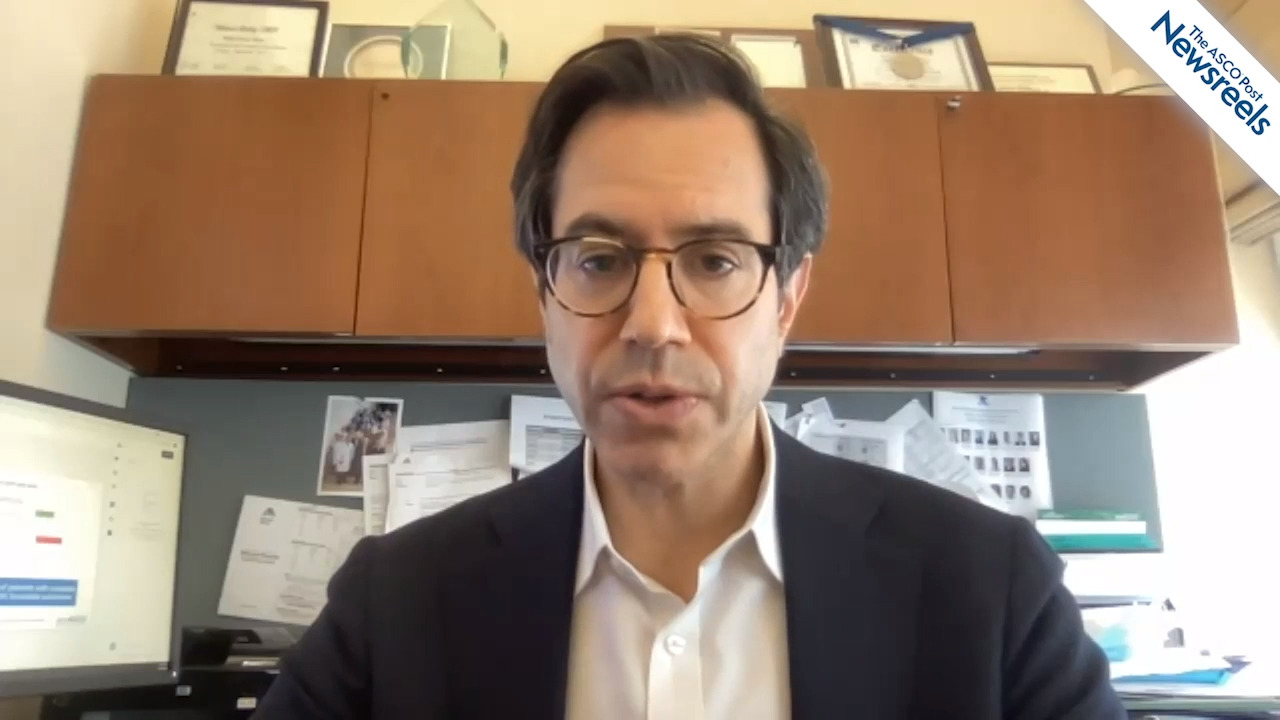Matt D. Galsky, MD, on Bladder Cancer: Neoadjuvant Therapy With Gemcitabine, Cisplatin, and Nivolumab
Matt D. Galsky, MD, of the Tisch Cancer Institute at Icahn School of Medicine at Mount Sinai, discusses results from a phase II trial designed to test gemcitabine and cisplatin plus nivolumab as neoadjuvant therapy in patients with muscle-invasive bladder cancer and to better predict benefit in those who opted out of cystectomy (Abstract 4503).
Sumanta K. Pal, MD, on Urothelial Carcinoma: Comparing Cisplatin and Gemcitabine With or Without Berzosertib
Sumanta K. Pal, MD, of City of Hope, discusses results from a phase II study that sought to determine whether adding berzosertib, a selective ATR inhibitor, to the standard upfront chemotherapy regimen of cisplatin with gemcitabine may improve outcomes in patients with metastatic urothelial carcinoma (Abstract 4507).
KEYNOTE-361: First-Line Pembrolizumab With or Without Chemotherapy vs Chemotherapy Alone in Advanced Urothelial Carcinoma
As reported in The Lancet Oncology by Thomas Powles, MD, PhD, and colleagues, the phase III KEYNOTE-361 trial has shown no significant improvement in progression-free or overall survival with first-line pembrolizumab plus platinum-based chemotherapy vs chemotherapy alone in patients with advanced...
Inclusion of Patients With Brain Metastases in Phase III Trials in Advanced Breast Cancer, Lung Cancer, and Melanoma
In a study reported in a research letter in JAMA Oncology, Corbett et al found that the majority of phase III trials investigating systemic therapy in patients with advanced lung cancer, breast cancer, and melanoma over the past 20 years have excluded or restricted enrollment of those with brain...
CheckMate 274: Adjuvant Nivolumab in High-Risk Muscle-Invasive Urothelial Carcinoma
As reported in The New England Journal of Medicine by Dean F. Bajorin, MD, and colleagues, an interim analysis of the phase III CheckMate 274 trial has shown improved disease-free survival with adjuvant nivolumab vs placebo among all patients with high-risk muscle-invasive urothelial carcinoma who...
Choice of First-Line Platinum Chemotherapy Does Not Significantly Impact Efficacy of Second-Line Immunotherapy in Advanced Urothelial Carcinoma
In a presentation of real-world data given during the 2021 ASCO Annual Meeting, Miron et al concluded that the choice of first-line platinum chemotherapy did not result in a significant difference in overall survival benefit among patients with advanced bladder cancer who were able to go on to...
Pembrolizumab in BCG-Unresponsive High-Risk Non–Muscle Invasive Bladder Cancer: KEYNOTE-057
As reported in The Lancet Oncology by Arjun V. Balar, MD, and colleagues, the phase II KEYNOTE-057 trial showed that pembrolizumab produced enduring responses in a cohort of patients with high-risk non–muscle invasive bladder cancer unresponsive to bacillus Calmette-Guérin (BCG) who were ineligible ...
Does the Addition of Bevacizumab to Gemcitabine/Cisplatin for Metastatic Urothelial Carcinoma Improve Survival?
As reported in the Journal of Clinical Oncology by Jonathan E. Rosenberg, MD, and colleagues, the phase III CALGB 90601/Alliance trial has shown no improvement in overall survival with the addition of bevacizumab to gemcitabine/cisplatin in patients with metastatic urothelial carcinoma. Study...
FDA ODAC Meeting Focuses on ‘Dangling’ Accelerated Approvals of Anti–PD-1/PD-L1 Antibodies
In a perspective in The New England Journal of Medicine, Julia A. Beaver, MD, and Richard Pazdur, MD, of the U.S. Food and Drug Administration (FDA) Oncology Center of Excellence (OCE), discussed issues surrounding “dangling” accelerated approvals of anti–PD-1/PD-L1 antibodies—ie, approvals for...
Enfortumab Vedotin-ejfv After PD-1 or PD-L1 Inhibitor Therapy for Cisplatin-Ineligible Patients With Advanced Urothelial Carcinoma
As reported in The Lancet Oncology by Evan Y. Yu, MD, and colleagues, findings in a cohort of the phase II EV-201 study showed a high response rate with the nectin-4–directed antibody-drug conjugate enfortumab vedotin-ejfv in cisplatin-ineligible patients with advanced or metastatic urothelial...
Sacituzumab Govitecan-hziy for Patients With Pretreated Metastatic Urothelial Carcinoma
In a cohort of the phase II TROPHY-U-01 trial reported in the Journal of Clinical Oncology, Scott T. Tagawa, MD, MS, and colleagues found that the antibody-drug conjugate sacituzumab govitecan-hziy produced responses in patients with metastatic urothelial carcinoma progressing after platinum-based...
Oncologists Launch Global Society to Improve Clinical Research, Standardize Treatment, and Improve Patient Education About Rare Genitourinary Tumors
Late this past year, a group of oncologists led by Philippe E. Spiess, MD, MS, FRCS(C), FACS, Assistant Chief of Surgical Services and Senior Member in the Department of Genitourinary Oncology at Moffitt Cancer Center and Professor in the Department of Urology at the University of South Florida;...
FDA Pipeline: Priority Reviews of Treatments for Bladder and Lung Cancers
Recently, the U.S. Food and Drug Administration (FDA) granted Priority Review designation to treatments for surgically resected, high-risk, muscle-invasive urothelial carcinoma and epidermal growth factor receptor exon 20 insertion mutation–positive metastatic non–small cell lung cancer (NSCLC)....
FDA ODAC Votes in Favor of Retaining Accelerated Approval for Bladder Cancer Treatments
Roche has announced the U.S. Food and Drug Administration (FDA) Oncologic Drugs Advisory Committee (ODAC) voted 10 to 1 in favor of maintaining the accelerated approval of atezolizumab for the treatment of adults with locally advanced or metastatic urothelial carcinoma who are not eligible for...
YouTube Videos on Bladder Cancer: Study Focuses on Quality of Content
Social media platforms are valuable tools for educating patients about serious health topics, but they can also spread false and biased information with potentially harmful results, according to recent research published by Stacy Loeb, MD, MSc, and colleagues in European Urology. Researchers...
Genitourinary Oncology Highlights 2020–2021 Almanac
Landmark changes in the treatment of genitourinary cancers have occurred over the past year, as summarized in this year’s Genitourinary Oncology Almanac from The ASCO Post. Starting with our area of focus, metastatic renal cell carcinoma, the saga continues with two more positive phase III trials...
FDA Pipeline: Recent Designations in Urothelial Cancer, Cervical Cancer, Cholangiocarcinoma, and More
Recently, the U.S. Food and Drug Administration (FDA) issued regulatory decisions related to treatments for urothelial cancer, cervical cancer, cholangiocarcinoma, solid tumors, and colorectal cancer. Acceptance of Two Supplemental Biologics License Applications for Enfortumab Vedotin-ejfv in...
Enrique Grande, MD, PhD, on Urothelial Carcinoma: Treatment With Atezolizumab, Platinum, and Gemcitabine
Enrique Grande, MD, PhD, of The University of Texas MD Anderson Cancer Center, Madrid, discusses phase III overall survival results from the IMvigor130 study of atezolizumab plus platinum and gemcitabine vs placebo plus platinum and gemcitabine in patients with previously untreated metastatic urothelial carcinoma (Abstract CT187).
FDA Grants Accelerated Approval to Sacituzumab Govitecan-hziy for Advanced Urothelial Cancer
On April 13, 2021, the U.S. Food and Drug Administration (FDA) granted accelerated approval to sacituzumab govitecan-hziy (Trodelvy) for patients with locally advanced or metastatic urothelial cancer who previously received a platinum-containing chemotherapy and either a PD-1 or PD-L1 inhibitor....
EV-301 and EV-201 Trials: Enfortumab Vedotin-ejfv Improves Survival in Metastatic Urothelial Cancer
Enfortumab vedotin-ejfv continues to move the needle forward as a validated treatment option for advanced urothelial carcinoma. At the 2021 Genitourinary Cancers Symposium, results from the phase III EV-301 study1 and EV-201 Cohort 22 provided support for the use of this agent in both patients...
Adjuvant Atezolizumab in Muscle-Invasive Urothelial Carcinoma: IMvigor010
As reported in The Lancet Oncology by Joaquim Bellmunt, MD, PhD, and colleagues, the phase III IMvigor010 trial showed no improvement in disease-free survival with adjuvant atezolizumab vs observation in patients with muscle-invasive urothelial carcinoma. Study Details In the open-label trial, 809...
Nivolumab: First Adjuvant Immunotherapy to Show Survival Benefit in High-Risk Muscle-Invasive Urothelial Cancer
Adjuvant therapy with nivolumab, an anti–PD-1 immune checkpoint inhibitor, after radical surgery improved disease-free survival in high-risk muscle-invasive urothelial cancer regardless of PD-L1 status, according to the results of the CheckMate 274 randomized phase III trial presented at the 2021...
Arlene O. Siefker-Radtke, MD, on Urothelial Bladder Cancer: New Settings for Immune Checkpoint Inhibitors
Arlene O. Siefker-Radtke, MD, of The University of Texas MD Anderson Cancer Center, discusses the changing therapeutic landscape in which atezolizumab, avelumab, and pembrolizumab have either been approved or are under review for treating urothelial bladder cancer in the metastatic, superficial, and adjuvant settings.
FDA Oncologic Drugs Advisory Committee to Review Status of Six Indications Granted Accelerated Approval
Recently, the U.S. Food and Drug Administration (FDA) announced that the agency will hold a public meeting of the Oncologic Drugs Advisory Committee on April 27 to 29 to discuss six indications granted accelerated approval that have since reported results from confirmatory trials that have not...
Atezolizumab’s Indication in Previously Treated Metastatic Bladder Cancer Is Withdrawn
Genentech, a member of the Roche Group, announced on March 8 that the company is voluntarily withdrawing the U.S. indication for atezolizumab (Tecentriq) in patients with prior platinum-treated metastatic urothelial carcinoma. This decision was made in consultation with the U.S. Food and Drug...
Enfortumab Vedotin-ejfv in Previously Treated Advanced Urothelial Carcinoma
As reported in The New England Journal of Medicine by Powles et al, a prespecified interim analysis of the phase III EV-301 trial has shown improved overall survival with enfortumab vedotin-ejfv vs investigator choice of chemotherapy in patients with previously treated advanced urothelial...
Tracy L. Rose, MD, on Bladder Cancer: Gemcitabine, Cisplatin, and Pembrolizumab as Neoadjuvant Therapy
Tracy L. Rose, MD, of the University of North Carolina at Chapel Hill, discusses phase II results of gemcitabine and split-dose cisplatin plus pembrolizumab as neoadjuvant therapy prior to radical cystectomy for patients with muscle-invasive bladder cancer. The trial showed this combination treatment is generally safe and may improve pathologic downstaging, but further study is warranted (Abstract 396).
Elizabeth R. Plimack, MD, on Bladder Cancer Highlights From the 2021 Genitourinary Cancers Symposium
Elizabeth R. Plimack, MD, of Fox Chase Cancer Center, discusses key abstracts discussed at this year’s meeting on bladder cancer and offers her views on the latest trends and findings (Abstracts 391, 393, 434).
Hypofractionated vs Conventionally Fractionated Radiotherapy for Locally Advanced Bladder Cancer
In an individual patient-level meta-analysis of two phase III trials reported in The Lancet Oncology, Choudhury et al found that a hypofractionated radiotherapy regimen was associated with improved invasive locoregional control and similar toxicity vs a standard fractionation regimen in patients...
Christopher Sweeney, MBBS, and Thomas Powles, MD, PhD, on Treating GU Malignancies: Expert Views
A spirited discussion ensued when we asked Christopher Sweeney, MBBS, of Dana-Farber Cancer Institute, and Thomas Powles, MD, PhD, of Cancer Research UK Barts Centre, to compare notes on how they treat bladder, prostate, and kidney cancers.
FDA Pipeline: Priority Reviews in KRAS G12C–Mutated NSCLC, Non–Muscle-Invasive Bladder Cancer
Recently, the U.S. Food and Drug Administration (FDA) granted Priority Review to treatments for KRAS G12C–mutated non–small cell lung cancer (NSCLC) and high-risk, bacillus Calmette-Guérin–unresponsive non–muscle-invasive bladder cancer. A new drug application for a therapy for Waldenström’s...
Monika Joshi, MD, on Urothelial Cancer of the Bladder: Durvalumab and Radiotherapy for Localized Disease
Monika Joshi, MD, of Penn State Hershey Cancer Institute, discusses phase II results from the DUART study, which explored the efficacy of concurrent durvalumab, a checkpoint inhibitor, and radiation therapy followed by adjuvant durvalumab in patients with localized urothelial cancer of the bladder (Abstract 398).
Daniel M. Geynisman, MD, on Bladder Cancer: Risk-Enabled Treatment After Neoadjuvant Chemotherapy
Daniel M. Geynisman, MD, of Fox Chase Cancer Center, discusses phase II results from the RETAIN BLADDER study, which sequenced bladder tumor samples while treating patients with neoadjuvant methotrexate, vinblastine, doxorubicin, and cisplatin chemotherapy. The goal was to increase metastasis-free survival and also preserve the bladder and quality of life (Abstract 397).
Enfortumab Vedotin-ejfv Prolongs Survival in Patients With Metastatic Urothelial Carcinoma
Treatment with the antibody-drug conjugate enfortumab vedotin-ejfv has been found to significantly increase survival of patients with metastatic urothelial carcinoma, according to results from the phase III EV-301 clinical trial. These findings were presented by Thomas Powles, MD, PhD, and...
Thomas Powles, MD, PhD, on Urothelial Carcinoma: Enfortumab Vedotin-ejfv vs Chemotherapy
Thomas Powles, MD, PhD, of Cancer Research UK Barts Centre, discusses phase III results from the EV-301 trial, which showed that enfortumab vedotin is the first therapy to demonstrate a significant survival advantage over standard chemotherapy in patients with previously treated locally advanced or metastatic urothelial carcinoma (Abstract 393).
CheckMate 274: Adjuvant Nivolumab May Improve Disease-Free Survival in Patients With Muscle-Invasive Urothelial Carcinoma
Treatment with the immunotherapy nivolumab with or without cisplatin-based chemotherapy following radical surgery significantly improved disease-free survival in patients with muscle-invasive urothelial carcinoma, irrespective of their PD-L1 status, according to a study that will be presented by...
FDA Pipeline: Priority Reviews for Immunotherapies in Gastric Cancers, Anal Cancer
The U.S. Food and Drug Administration (FDA) recently granted Priority Review to nivolumab as either adjuvant or first-line therapy in several types of gastric cancers, as well as to a novel PD-1 inhibitor for locally advanced or metastatic squamous cell carcinoma of the anal canal. The FDA also...
Feasibility Study of Radical Cystectomy vs Intravesical BCG for High-Grade, Non–Muscle Invasive Bladder Cancer
As reported in the Journal of Clinical Oncology by Catto et al, the BRAVO-Feasibility study showed that recruitment of patients with high-grade, non–muscle invasive bladder cancer into a randomized trial comparing radical cystectomy vs intravesical bacillus Calmette-Guérin (BCG) proved difficult,...
Germline-Somatic Interactions in Advanced Urothelial Cancer and Their Role in Disease Progression
In a study reported in Nature Communications, Bishoy M. Faltas, MD, of the Department of Medicine, Division of Hematology and Medical Oncology, Weill Cornell Medicine, New York, and colleagues identified common germline-somatic variant interactions in advanced urothelial cancer, with these...
Spectrum of Germline-Somatic Interactions in Advanced Urothelial Cancer
In a study reported in Nature Communications, Vosoughi et al identified common germline-somatic variant interactions in advanced urothelial cancer, with these interactions appearing to play a central role in disease progression. As stated by the investigators, “The prevalence and the biologic...
ESMO Immuno-Oncology 2020: Adjuvant Atezoliumab for Patients With Muscle-Invasive Urothelial Cancer and Presence of Postsurgical ctDNA
Patients with muscle-invasive urothelial cancer and postsurgical circulating tumor DNA (ctDNA) positivity have high risk of disease recurrence following cystectomy and experienced improved clinical outcomes with adjuvant atezolizumab as compared to patients undergoing observation. These...
DANUBE Trial Reports No Survival Benefit With First-Line Durvalumab in Metastatic Urothelial Carcinoma
As reported in The Lancet Oncology by Thomas Powles, MD, of Barts Cancer Institute, Queen Mary University of London, and colleagues, the phase III DANUBE trial showed that durvalumab monotherapy did not prolong overall survival vs standard chemotherapy in previously untreated patients with...
Expert Point of View: Kilian M. Gust, MD
Formal discussant Kilian M. Gust, MD, of the Medical University of Austria, Vienna, reminded listeners that JAVELIN Bladder 100 was designed at a time when no checkpoint inhibitor was approved for the treatment of metastatic urothelial cancer. In the past 5 years, five immune checkpoint inhibitors...
Front-Line Avelumab Maintenance Improved Survival Across Subgroups With Advanced Urothelial Carcinoma
A strategy of front-line maintenance treatment with the PD-L1 inhibitor avelumab combined with best supportive care improved both progression-free and overall survival vs best supportive care alone across prespecified subgroups of patients with advanced or metastatic urothelial carcinoma that had...
Expert Point of View: Richard Cathomas, MD
In his discussion of KEYNOTE-361 and the DANUBE trial, Richard Cathomas, MD, of Kantonsspital, Graubünden, Switzerland, said both studies yielded disappointing results. Overall, in these trials as well as current evidence from other trials, treatment of platinum-eligible (cisplatin or carboplatin)...
Checkpoint Inhibitor and Chemotherapy Combinations Fail to Move Bar as First-Line Therapy for Advanced Urothelial Cancer
Two different phase III studies found that combining an anti–PD-1/PD-L1 checkpoint inhibitor (pembrolizumab in KEYNOTE-361) with platinum-based chemotherapy or with another checkpoint inhibitor (the anti–CTLA-4 antibody tremelimumab in DANUBE) failed to significantly improve overall or...
Gemcitabine and Daily Radiation for Patients With Muscle-Invasive Bladder Cancer
Bladder preservation with trimodality therapy may be a safe and effective alternative to cystectomy for selected patients with muscle-invasive bladder cancer, according to results from a phase II trial presented by Coen et al at the virtual 2020 American Society for Radiation Oncology (ASTRO)...
Co-Leader of Immunotherapy Trial Reflects on ‘Practice-Changing’ Results in Advanced Bladder and Other Urinary Tract Cancers
In a large, randomized clinical trial, researchers evaluated the immunotherapy drug avelumab for patients with advanced urothelial cancer. The findings of the trial, called the JAVELIN Bladder 100 study, are “very exciting,” even “practice-changing,” said the trial’s co-leader, Petros Grivas, MD,...
Neoadjuvant Dual Checkpoint Blockade in Certain Patients With Localized Bladder Cancer
Neoadjuvant combination therapy with the anti–CTLA-4 therapy tremelimumab and the anti–PD-1 therapy durvalumab was well tolerated and showed early signs of activity in patients ineligible to receive cisplatin-based chemotherapy, all of whom had tumors with high-risk features that are associated...
Urine-Based Liquid Biopsy May Perform Similarly to Urine Cytology in Detecting Urothelial Carcinoma
Analysis of DNA copy number variants in the cells exfoliated in urine showed improved sensitivity and similar specificity in detecting urothelial carcinoma compared to urine cytology, according to results published by Zeng et al in Clinical Cancer Research. “Urine cytology, which is widely used to...










